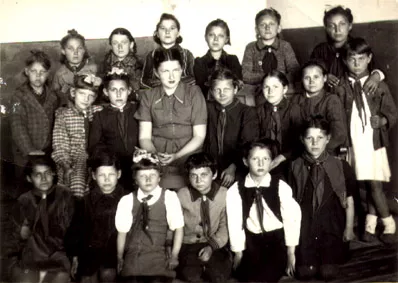Molka Mirskaya with her schoolmates
This is me with my schoolmates. The picture was taken in Kokand in 1943. I am third from the right in the top row.
I was born in 1933 in Kishinev. I had a wonderful childhood. My mother and grandmother loved me very much, and my dad just adored me.
On 22nd June 1941 the Great Patriotic War broke out. My father was demobilized in several days. Kishinev was on fire, before the Red Army retreated. Mother could hardly pack some things. My mother and grandmother left the city, holding me and Shepshel tight. I remember things burning and collapsing. It was hideous. My mother covered my eyes with her hand so I wouldn’t get scared. We met Uncle Avrum and Aunt Feiga on our way.
After a while way we reached Rostov-upon-Don. I was eight years old, and all those things are mixed up in my memory. I remember that we stayed in Rostov for some time and then in a Cossack village near Rostov. This is how we spent the first war winter, but I can’t recall everything clearly now. When the Fascists approached Rostov, we moved on. We were brought to Tashkent, and from there we went to a collective farm near Kokand .
The evacuated were lodged in a club. There was nothing to sleep on, so my grandmother, mother and Feiga picked up grass, dried it and put it on the floor. In several days collective farmers brought some simple trestle beds that we used. We starved, the food provided by the collective farm was not enough. Other Jewish families were our neighbors. There was one family from Kharkov, another family was from Poland. I went out with other children, looking for food in the collective farm. We managed to find apricots, carrots and beets. Uzbeks let us pick things up from the ground, without taking anything from the tree. Uncle Avrum walked to the military enlistment office, located in Kokand, to go to war and not to starve. My mother and Feiga worked in the collective farm, picking cotton. It was cold. The evacuees used an oven from the club for heating purposes. We filled it with cotton waste and started the fire with coal taken from Uzbeks, as we had no matches.
I turned nine, and still hadn’t started school. I was ashamed of my illiteracy in front of my coevals. Our neighbor, a Jew from Kharkov, taught me the letters. I started writing. Then I went to school without feeling ashamed. I was accepted in the third grade. However, my name was changed. When my mother began to process my documents – my birthday certificate had been lost – she was told that the name of Molka didn’t exist and they suggested naming me Maya. There were many other problems, and my mother agreed to it even without arguing. At the end of the day it wasn’t important what was written in my documents. I became Maya then.





















